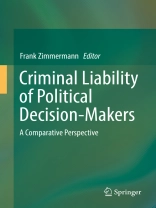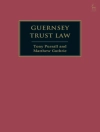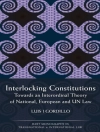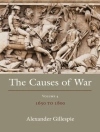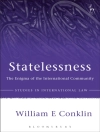This book is dedicated to a fundamental conflict in modern states: those persons holding public office are no more than ordinary citizens. Therefore, their activities must – as a matter of principle – be subject to full judicial control. But at the same time, democratically legitimated politicians need some discretion in their decision-making.
Allegations of politicians committing criminal offences in office quickly attract a great deal of media attention. Even politicians themselves frequently use such allegations to discredit their political opponents. However, to date this topic has not been fully addressed on an academic level. This book is a first step in this direction.
The individual contributions cover topics such as:
- “bad” political decisions that result in a waste of taxpayers’ money
- corruption and conflicts of interest in political decision-making
- immunities and procedural obstacles to the effective prosecution of politicians
- abuse of criminal law and criminal proceedings in the political arena
- criminal liability for decisions taken in situations of state emergency
- the role of criminal law in public opinion.
Leading experts examine these and other issues from a comparative perspective.
Tabella dei contenuti
Part I – Comparative Case Study: Country Reports: Introduction: Comparing the Criminal Liability of Political Decision Makers on the Basis of a Concrete Case by Frank Zimmermann.- The Case to Be Analysed by Frank Zimmermann.- Belgium by Wendy De Bondt.- Finland by Dan Helenius.- France by Guillaume Chetard.- Germany by Frank Zimmermann.- Greece by Willem Geelhoed.- Norway by Annika Suominen.- Spain by Manuel Maroto Calatayud.- Part II – Conclusions from the Country Reports & Further Thoughts on the Interplay of Criminal Law and Politics: A Comparative Analysis of Criminal Laws Protecting Public Budgets – Can “Bad” Political Decisions Be Criminalised? by Frank Zimmermann.- Criminal Responsibility of Political Decision Makers and Bribery-Related Offences: a Brief Comparative Analysis of Some Prominent Aspects by Manuel Maroto Calatayud.- A Comparative Analysis of Special Sanctions Applicable to Political Decision Makers by Dan Helenius.- A Comparative Analysis of National Provisions Granting Immunity to Politicians by Federica Iovene.- Comparing Special Procedural Rules for the Prosecution of Politicians – A Blessing or a Curse? by Annika Suominen.- Corruption as Disloyalty? by Gabriel Pérez Barberá.- Political Decision-Making and the Phenomenon of Elite Corruption by Bernd Heinrich.- Ill-Motivated Criminal Proceedings as a Means in the Political Arena? by Athina Giannakoula.- Can Politicians Shield Themselves Against Criminal Liability By Means of Law Reform? by Nicola Recchia.- Criminal Liability of Political Decision Makers in Time of Crisis by Petter Asp.- Criminal Law and the Financial Crisis: The Proceedings against Iceland’s Former Prime Minister Geir H. Haarde by Ragnheiður Bragadóttir.- Prosecutorial Discretion in the Netherlands – An Advantage for Politicians? by Willem Geelhoed.- The Politics of Political Hate Speech in Belgium by Wendy De Bondt.- Criminal Liability for Accidents in France: Is Corporate Criminal Liability of Public Entities the Solution? by Guillaume Chetard.
Circa l’autore
Frank Zimmermann is a post-doctoral research fellow at the Ludwig-Maximilians-Universität München. His main fields of research are the relationship between criminal law and politics, German and European criminal law (particularly conflicts of criminal jurisdiction) as well as international cooperation in criminal matters.
